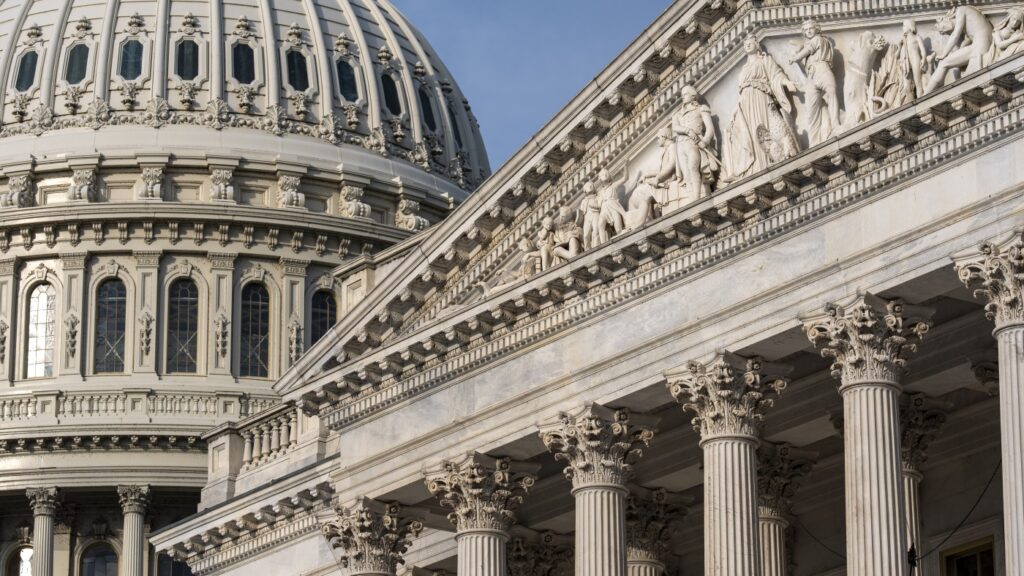
The Senate side of the Capitol is seen in Washington, early Monday, June 30, 2025, as Republicans plan to begin a final push to advance President Donald Trump's big tax breaks and spending cuts package. (AP Photo/J. Scott Applewhite)
Senate Republicans have successfully passed President Trump’s sweeping domestic policy bill, setting the stage for a decisive vote in the House. The legislation proposes trillions of dollars in tax cuts while scaling back spending on Medicaid, food assistance, and clean energy initiatives. The final Senate vote concluded at 51-50, with Vice President JD Vance casting the tie-breaking vote. Notably, three Republican senators—Susan Collins of Maine, Thom Tillis of North Carolina, and Rand Paul of Kentucky—opposed the bill.
The bill now advances to the House, where it is expected to face significant opposition from some GOP members. The vote marks the culmination of intense negotiations between fiscal conservatives seeking deeper spending cuts and other Republicans concerned about the bill’s potential nationwide impact.
Key Provisions and Controversies
The legislation aims to extend the tax cuts initially passed by Republicans in 2017, thereby preventing a potential tax rate increase at the year’s end. To offset the cost, the bill proposes cuts to the Supplemental Nutrition Assistance Program (SNAP) and significant changes to Medicaid, which currently provides healthcare to approximately 70 million low-income, elderly, and disabled Americans. Early estimates suggest that around 11 million people could lose coverage under the proposed changes.
Despite the contentious nature of the bill, Republicans managed to strike a delicate balance, passing it just days before a self-imposed July 4 deadline. This move underscores President Trump’s influence in unifying the GOP’s diverse factions.
“With this legislation, we’re fulfilling the mandate we were entrusted with last November and setting our country and the American people up to be safer, stronger, and more prosperous,” said Senate Majority Leader John Thune, R-S.D., following the vote.
Challenges Ahead in the House
While the Senate’s passage of the bill is a significant step, the legislation still faces a challenging path in the House. Republicans utilized a special budget tool known as reconciliation to bypass a Democratic filibuster, allowing the bill to pass with a simple majority. However, the bill must adhere to strict Senate rules, requiring all elements to be primarily budget-related, leading to the removal of several GOP priorities before the final vote.
House Republicans must now reconcile their version of the bill with the Senate’s, a task complicated by the narrow GOP majority and internal divisions. House Speaker Mike Johnson, R-La., faces a crucial test in shepherding the bill through without substantial changes. Johnson has urged the Senate to minimize alterations, having previously passed the bill by a single vote with significant support from President Trump to sway last-minute holdouts.
“The American people gave us a clear mandate, and after four years of Democrat failure, we intend to deliver without delay,” Johnson stated following the Senate vote.
Medicaid and Social Safety Net Implications
The Senate’s version closely mirrors the House bill passed in May, both extending the 2017 tax cuts and increasing funding for the military and immigration enforcement. However, the chambers diverge on funding methods, with some House Republicans rejecting Senate changes outright.
Medicaid is a primary target for cost savings, with the House proposing new work requirements for childless adults without disabilities. The Senate expanded these requirements to include parents of older children. Additionally, the Senate aimed to reduce reliance on provider taxes, which states use to secure federal Medicaid funds. To address concerns about rural hospital closures, the Senate included a $50 billion fund to support these facilities starting in 2026.
Senator Susan Collins expressed her opposition, stating, “I strongly support extending the tax relief for families and small businesses. My vote against this bill stems primarily from the harmful impact it will have on Medicaid, affecting low-income families and rural health care providers like our hospitals and nursing homes.”
Deficit Concerns and Economic Impact
Another contentious issue is the proposed increase in the debt ceiling. The House approved a $4 trillion hike, while the Senate opted for $5 trillion. Treasury Secretary Scott Bessent has warned that without action, the U.S. risks a catastrophic default on its debt by August.
The Congressional Budget Office estimates that the Senate bill would add over $3 trillion to the deficit over the next decade. The extension of the 2017 tax cuts accounts for the majority of this cost, though other changes also contribute.
The Senate’s approach to the state and local tax (SALT) deduction, crucial for securing votes from GOP lawmakers in high-tax blue states, remains a sticking point. The Senate maintained the House’s increased threshold, but the provision will expire after 2028.
Furthermore, the bill targets clean energy credits from the Inflation Reduction Act, with the House proposing an aggressive rollback schedule. This plan could halt approximately $522 billion in investments, many in Republican-led states. The Senate responded by proposing additional taxes on new wind and solar projects with supply chains linked to China.
The passage of this bill represents a significant legislative effort by the GOP, but its future remains uncertain as it faces scrutiny and potential amendments in the House. The outcome will have far-reaching implications for the U.S. economy, social safety nets, and the political landscape.







